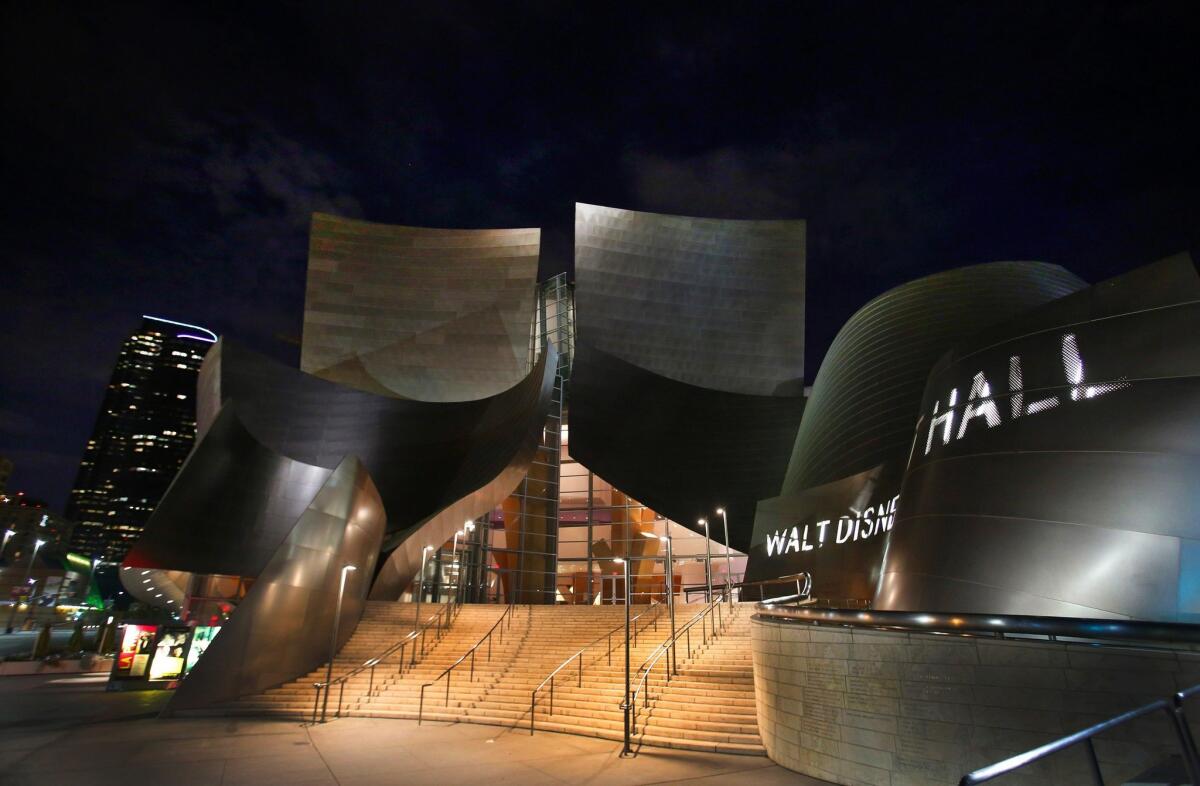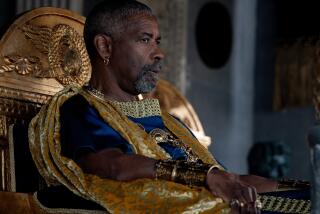Review: Dudamel, L.A. Philharmonic power through Mahler’s potent Sixth

- Share via
Gustav Mahler was not only the first great symphonist to usher music into the modern age, he was music’s first great modern neurotic. The two are not unrelated.
The sixth and most agitated of his nine completed symphonies was written in 1903 and 1904, and it expressed, like no music that had come before it, a world in the thrall and terror of uncertain change.
Gustavo Dudamel, who led a ferociously all-consuming performance of the 85-minute Sixth at Walt Disney Concert Hall on Thursday night, is not, by all appearances, a great neurotic. He is, though, becoming a great Mahlerian. Those two are not unrelated either.
For Dudamel, neurosis may need to be induced. He is thus far the only musician to have binge-conducted Mahler. Three years ago he led two complete cycles of the composer’s nine completed symphonies over a period of three weeks on two continents (in Los Angeles and Caracas, Venezuela).
Each symphony takes a physical and psychic toll on performers — and listeners. By the end, after a final performance in Caracas of the Eighth with two orchestras and a chorus of 1,200 singers, Dudamel seemed on the verge of incoherence, his ego and Mahler’s joined.
Since then, Dudamel has conducted a massive Eighth at the Salzburg Festival, and he has continued to program Mahler on occasion with the Simón Bolívar Symphony Orchestra.
But mostly, he has let the effects of the Mahler binge slowly infuse his musical psyche. Last fall, he returned to Mahler in L.A. with a profoundly reconsidered and deepened insight into the Fifth, a symphony he has conducted since he was a kid.
He has considerably less experience with the more turbulent Sixth, and when he conducted it with the L.A. Phil during the Mahler Project, he was still finding his way. It was but one of many Mahlerian shoals he had to navigate.
Now it’s a major event. The Sixth will comprise one of the two programs on the L.A. Phil’s Asian tour later this month.
The symphony begins with crushingly grim march rhythms and the xylophone sounding like the rattling of bones and ends with devastating blows from a giant hammer and maybe the nastiest final chord in symphonic literature. It has the subtitle “Tragic.”
Commentators like to point out that Mahler wrote his most fatalistic symphony at the happiest time of his life. He was Vienna’s most prominent musician. He was married to one of Vienna’s beautiful and desired women. He doted on their young children.
The easy armchair psycho-biographical answer for a composer whose symphonies are often read as autobiographical is that he had a second sense for foreboding. Within a couple of years, two young children would be dead and he would learn of Alma Mahler’s infidelity, a heartbreak that led him to consult Sigmund Freud. He contracted a fatal heart infection and died in 1911 at age 51.
A less Romantic interpretation is that foreboding was in Mahler’s neurotic nature. He had an artist’s awareness of his times. He sensed the fury of progress and warned that the way to embrace it was to understand it, to ground it. He wrote wild music, the most modern the world knew, but he shaped it classically.
Dudamel’s Sixth is very heavy. The orchestra is gigantic, and he welcomes the weight. He beefed up the bass instruments. The guttural tuba and heavyweight bass drum had the effect of being part of the auditorium’s foundation, their sound so grounded that it could hold up the building. Oboes and horns raised their bells for dramatic and sonic painterly effect.
Mainly, though, Dudamel’s latest Mahler accomplishment is to treat the Sixth as a violent eye-opener. However much the work can seem a symphony of devastation, it is ultimately a symphony of conservation. Mahler includes amazing instances of stepping back and looking around him. Cowbells ring in the distance. He opens the vistas of enthralling landscapes.
A swelling lyricism can sweep everything away. The beauty is as modern as its horror. One way to treat Mahler’s agonizing foreboding today is as an environmental warning. And if we do, we will know to be careful.
Thursday in Disney Hall, the L.A. Phil played as though empowered with prophetic might. This will be a bold statement to take, as the L.A. Phil is about to, to China.
-----------------------------------
L.A. Philharmonic: Mahler’s Sixth
Where: Walt Disney Concert Hall, 111. S. Grand Ave., L.A.
When: 8 p.m. Saturday, 2 p.m. Sunday
Tickets: $26.50 to $212
Info: (323) 850-2000 or https://www.laphil.org
More to Read
The biggest entertainment stories
Get our big stories about Hollywood, film, television, music, arts, culture and more right in your inbox as soon as they publish.
You may occasionally receive promotional content from the Los Angeles Times.











